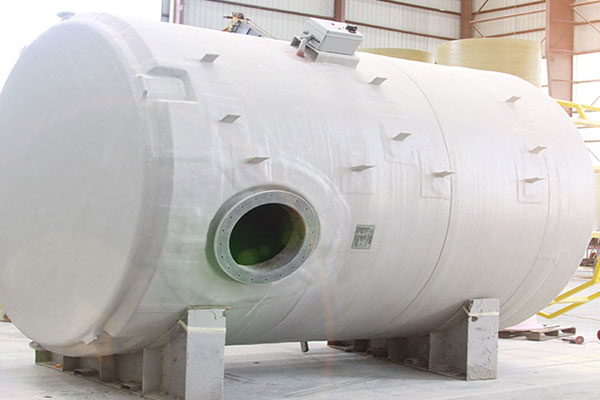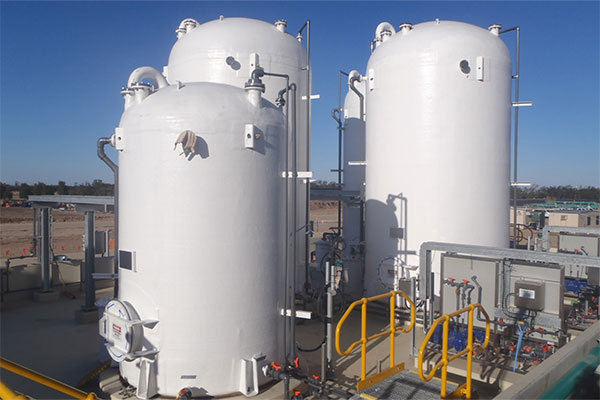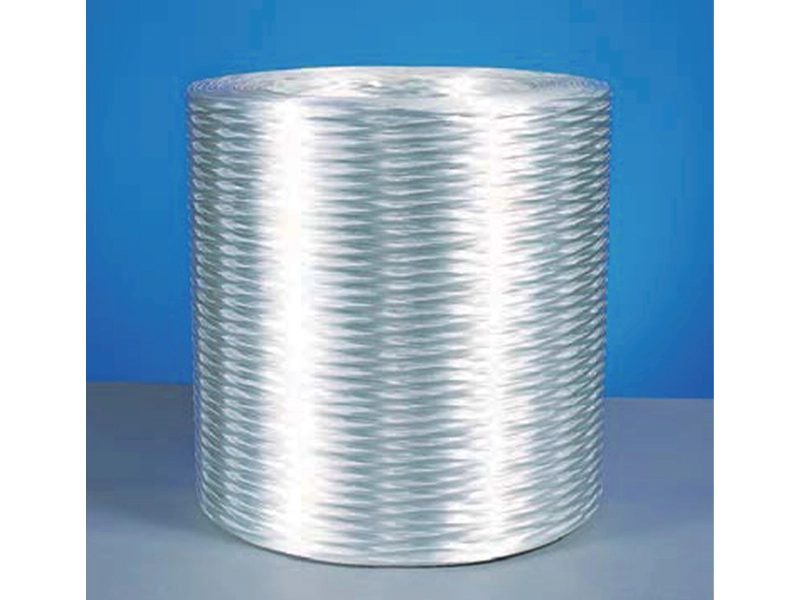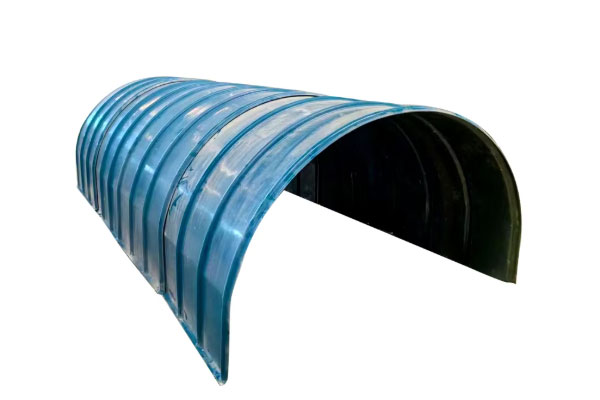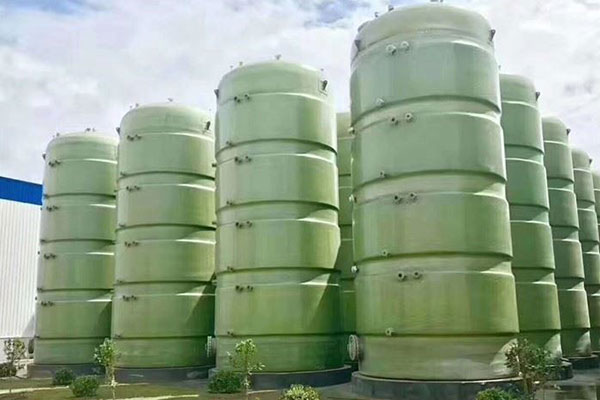FRP (Fiberglass Reinforced Plastic) chemical tanks are engineered storage containers manufactured using high-quality thermosetting resins reinforced with fiberglass. These tanks are designed to safely store and process a wide variety of aggressive chemicals, acids, alkalis, and corrosive substances in industrial and commercial settings. With exceptional resistance to corrosion, long service life, and customizable design features, FRP chemical tanks have become the preferred choice across chemical processing, water treatment, food and beverage, mining, and power industries.
Présentation des performances du produit
Principales caractéristiques
-
Résistance à la corrosion: Excellent resistance to a wide range of corrosive chemicals, including strong acids, alkalis, solvents, and oxidizers.
-
Durabilité: Long service life (15–25+ years), unaffected by rust or rot, even in outdoor or marine environments.
-
Lightweight & High Strength: Significantly lighter than steel tanks yet offers excellent tensile and impact strength.
-
Customizable Design: Flexible configuration including vertical, horizontal, cylindrical, conical bottom, double-wall, and underground tanks.
-
Thermal Stability: Suitable for storing chemicals at elevated temperatures depending on the resin system.
-
Faible entretien: Smooth internal surface prevents buildup of residues and simplifies cleaning.
-
Rentable: Lower installation and maintenance costs compared to traditional metal tanks.
Common Applications
-
Chemical Processing Plants
-
Wastewater and Water Treatment Facilities
-
Pulp and Paper Mills
-
Mining and Metallurgical Sites
-
Pharmaceutical Manufacturing
-
Petrochemical and Oil Refineries
-
Battery Acid and Electroplating Storage
-
Food-Grade Chemical Storage (with FDA-approved resins)
Tank Types & Configurations
| Tank Type | Description |
|---|---|
| Vertical Storage Tank | Standard upright cylindrical tank used for static storage of chemicals. Available with flat or conical bottoms. |
| Horizontal Storage Tank | Cylindrical tank laid on saddles, used for transport or when space height is limited. |
| Double Wall Tank | Secondary containment tank system for enhanced safety and leak prevention. |
| Underground Tank | Buried FRP tank with anti-buoyancy design and external coating for soil protection. |
| Process Tank | Customized tank with nozzles, baffles, manways, and mixers for in-process chemical reactions. |
Material Options
| Component | Description |
|---|---|
| Inner Liner | Corrosion barrier made from corrosion-resistant resin (e.g., Vinyl ester, Epoxy, Isophthalic polyester) |
| Structural Layer | Chopped strand mat, woven roving, or filament-wound fiberglass for mechanical strength |
| Outer Layer | Weather-resistant resin-rich coating or UV-protective paint for outdoor installations |
Technical Data Sheet (TDS)
1. Propriétés mécaniques
| Propriété | Value (Typical) | Méthode d'essai |
|---|---|---|
| Résistance à la traction | 120–200 MPa | ASTM D638 |
| Résistance à la flexion | 200–300 MPa | ASTM D790 |
| Résistance à la compression | 150–250 MPa | ASTM D695 |
| Modulus of Elasticity | 7,000–12,000 MPa | ASTM D790 |
| Impact Strength (Izod) | > 100 J/m | ASTM D256 |
| Dureté Barcol | 40–55 | ASTM D2583 |
2. Résistance chimique
| Chimique | Resistance Rating |
|---|---|
| Hydrochloric Acid (30%) | Excellent |
| Sulfuric Acid (98%) | Good–Excellent (vinyl ester) |
| Sodium Hydroxide (50%) | Excellent |
| Nitric Acid (10%) | Fair–Good |
| Acide acétique (5%) | Excellent |
| Ammonia | Excellent |
| Diesel / Fuels | Bien |
| Eau de mer | Excellent |
| Chlorine Solution | Good–Excellent |
Note: Final selection of resin system is based on specific chemical concentration, temperature, and duration of exposure.
3. Propriétés thermiques
| Propriété | Valeur |
|---|---|
| Maximum Operating Temperature (polyester) | 65°C |
| Maximum Operating Temperature (vinyl ester) | 100–120°C |
| Coefficient de dilatation thermique | 2.5 × 10⁻⁵ /°C |
| Heat Distortion Temperature | > 120°C (vinyl ester) |
Design Standards & Certifications
-
ASME RTP-1 – Design of reinforced thermoset plastic tanks
-
ASTM D3299 – Filament-wound storage tanks
-
ASTM D4097 – Contact-molded tanks
-
ISO 9001:2015 – Quality Management System
-
FDA CFR 177.2420 – Food-grade resin compliance (upon request)
-
NSF/ANSI 61 – Drinking water system components (optional)
-
UL 1316 / UL 1746 – Underground tank compliance (for fuel)
Optional Accessories & Features
-
Manholes with bolted covers
-
Flanged or threaded nozzles
-
Level indicators (sight glass or ultrasonic)
-
Ladders, platforms, and handrails
-
Agitators or mixers
-
Insulation and heat tracing
-
Leak detection sensors
-
Anti-static coatings
-
Internal liners (PVC, PTFE) for dual-laminate systems
Sizing & Customization
FRP chemical tanks are available in a wide range of sizes, from 500 liters to over 300,000 liters (300 m³). Each tank can be personnalisé based on:
-
Volume and dimensions
-
Operating pressure (typically atmospheric)
-
Chemical compatibility
-
Temperature range
-
Installation location (indoor/outdoor/underground)
-
Support type (skirt, saddle, flat bottom, leg)
Installation & Handling
-
Tanks should be installed on a properly leveled concrete pad or structure.
-
Lifting lugs or rigging hooks are provided for safe crane handling.
-
Do not place tanks near heat sources ou direct flame.
-
Underground tanks require anchoring against floatation and proper backfill materials.
Maintenance Guidelines
-
Perform visual inspections every 6–12 months.
-
Inspect nozzles, flanges, and gasket seals for leakage.
-
Periodically test liner integrity with spark testing (for critical applications).
-
Avoid excessive impact or point loading on the structure.
Why Choose Our FRP Chemical Tanks?
-
20+ years of experience in corrosion-resistant FRP solutions
-
In-house engineering and design for customized projects
-
ISO and ASME-compliant manufacturing processus
-
Worldwide shipping and installation support
-
Competitive pricing with rapid turnaround time
Case Studies / Industries Served
-
Petrochemical Plant (Malaysia): 100,000L vinyl ester FRP tanks for sulfuric acid storage
-
Mining Operation (Chile): 15 custom horizontal FRP tanks for sodium hydroxide
-
Food Factory (Germany): Food-safe FRP tanks for flavoring agents
-
Municipal Wastewater Facility (USA): Underground FRP tanks for sludge treatment
FRP Chemical Tanks
Série :
Produits mandataires >application
Chemical Processing Plants Wastewater and Water Treatment Facilities Pulp and Paper Mills Mining and Metallurgical Sites Pharmaceutical Manufacturing Petrochemical and Oil Refineries Battery Acid and Electroplating Storage Food-Grade Chemical Storage (with FDA-approved resins)
Matériel :
PRF
Taper :
FRP Chemical Tanks
FAQ
Q :
How do I choose the right resin for my chemical storage?
UN :
The correct resin depends on: Chemical type Concentration Operating temperature Duration of exposure For strong acids or oxidizing agents, vinyl ester resins are recommended. For general-purpose storage, isophthalic polyester may be sufficient.
Q :
What sizes are available for FRP chemical tanks?
UN :
We offer a wide range from 500 liters to over 300,000 liters. Tanks can be vertical, horizontal, underground, or rectangular based on your needs. Custom sizes and designs are also available.
Q :
Are FRP tanks safe for outdoor use?
UN :
Yes. FRP tanks are UV-resistant and weatherproof. An additional UV-protective gel coat or outer resin layer is often applied for long-term durability in outdoor environments.
Q :
Can FRP tanks handle high temperatures?
UN :
Yes, depending on the resin system: Vinyl ester tanks: up to 120°C Isophthalic polyester: up to 65°C Always confirm with the supplier based on your specific chemical and conditions.
Q :
Are FRP tanks pressure-rated?
UN :
Standard FRP chemical tanks are atmospheric pressure vessels. However, custom tanks can be engineered for low-pressure or vacuum applications, such as scrubbers or reactors.
Autres produits connexes

